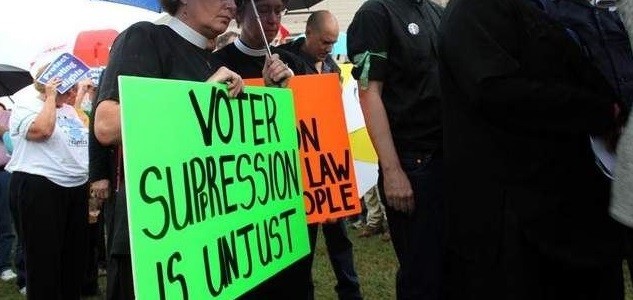
Texas: “It is perfectly constitutional for a Republican-controlled legislature to make partisan districting decisions, even if there are incidental effects on minority voters who support Democratic candidates.”
A new Op-ed in the New York Times by Richard L. Hasen, a professor of law and political science at the University of California, Irvine and an expert on election law, is a must read for everyone who cares about American democracy. This should be especially interesting to the African-American and Latino-American communities. According to the article:
Republican officials, especially but not only in the South, want to reduce early voting; impose voter-identification requirements; restrict voter registration; and, critically, draw districts either to crowd as many minority voters into as few districts as possible, or dilute concentrations of minority voters by dispersing them into as many white-controlled districts as possible. The Supreme Court decision unleashed all manner of new efforts to suppress minority voting — and a new batch of legal challenges.
Hasen also concludes that his own proposal is still the best solution:
If courts accepted my proposal to protect all voters, the Justice Department would not have to prove some legislators are racists. It would give new life to the goals of the Voting Rights Act and would protect not only minorities, but also other populations — for example, college students, who appear to bear the brunt of voter-ID laws.
The proposal Hasen speaks of can be found at the Social Science Research Network website titled ” Race or Party? How Courts Should Think About Republican Efforts to Make it Harder to Vote in North Carolina and Elsewhere”. Here is an excerpt from the abstract:
The race versus party bifurcation is unhelpful, and the solution to these new battles over election rules — what I call “The Voting Wars” — is going to have to come from the federal courts. Courts should apply a more rigorous standard to review arguably discriminatory voting laws. When a legislature passes an election administration law (outside the redistricting context) discriminating against a party’s voters or otherwise burdening voters, that fact should not be a defense. Instead, courts should read the Fourteenth Amendment’s Equal Protection Clause to require the legislature to produce substantial evidence that it has a good reason for burdening voters and that its means are closely connected to achieving those ends. The achievement of partisan ends would not be considered a good reason (as it appears to be in the redistricting context). These rules will both discourage party power grabs and protect voting rights of minority voters. In short, this new rule will inhibit discrimination on the basis of both race and party, and protect all voters from unnecessary burdens on the right to vote. Racism, Voter Suppression
Also, Hasen mentioned the Texas Department of Justice is making some bold claims in its quest to suppress the Democratic vote which in this case just happened to be minorities. Here is a more complete quote from the one Hasen used in his New York Times article that makes Texas’ government look pretty ridiculous. This is a quote from the “DEFENDANTS’ RESPONSE TO PLAINTIFFS AND THE UNITED STATES REGARDING SECTION 3(C) OF THE VOTING RIGHTS ACT” and so is written by the Texas government – making the outrageous explanation as to why they are only targeting Democratic voters and not minorities:
In 2011, both houses of the Texas Legislature were controlled by large Republican majorities, and their redistricting decisions were designed to increase the Republican Party’s electoral prospects at the expense of the Democrats. It is perfectly constitutional for a Republican-controlled legislature to make partisan districting decisions, even if there are incidental effects on minority voters who support Democratic candidates. See Hunt v. Cromartie, 526 U.S. 541, 551 (1999) (“[A] jurisdiction may engage in constitutional political gerrymandering, even if it so happens that the most loyal Democrats happen to be black Democrats and even if the State were conscious of that fact.”); League of United Latin Am. Citizens, Council No. 4434 v. Clements, 999 F.2d 831, 854 (5th Cir. 1993) (en banc) (“[Section 2 of the Voting Rights Act] is implicated only where Democrats lose because they are black, not where blacks lose because they are Democrats.”).
The redistricting decisions of which DOJ complains were motivated by partisan rather than racial considerations, and the plaintiffs and DOJ have zero evidence to prove the contrary the plaintiffs and DOJ want to turn Shelby County on its head by asking this Court to impose a preclearance regime in a case in which the underlying claims of racial discrimination are moot, the allegations of unconstitutional race discrimination are meritless, and the State has adopted new redistricting plans that address all potential legal deficiencies identified by either this Court or the D.C. district court. Racism, Voter Suppression
Leave a Reply